Broad commitment to sustainable development and cooperation
GEOMAR presented major research projects at the 2024 United Nations Ocean Decade Conference in Barcelona
Three years after the start of the United Nations Decade of Ocean Science for Sustainable Development, more than 1500 participants from science, politics, non-governmental organisations, business, civil society and United Nations entities took stock at a conference in the Spanish coastal city of Barcelona. The final declaration emphasised the need for adequate infrastructure, global ocean observation and equal access to data, joint knowledge production and the general provision of scientific findings. It also emphasised the need to incorporate these priorities into regional and national work. Particular attention should be paid to less developed countries and underrepresented social groups.
An eight-person delegation from GEOMAR Helmholtz Centre for Ocean Research Kiel took part in the conference. The group led by Director Professor Dr Katja Matthes was involved in various events at the conference and expanded its international networks.
GEOMAR coordinates the Ocean Decade programmes “Global Ocean Oxygen Decade” (GOOD) on oxygen loss in the ocean and “Digital Twins of the Ocean” (DITTO) on models and visualisations that support decision-making on the future of the ocean. In addition, the centre is involved in several programmes and projects of the Decade, which runs from 2021 to 2030.
The innovation platform “Shaping an Ocean Of Possibilities” (SOOP) also makes important contributions to the goals of the Ocean Decade: It aims to develop sustainable structures and technologies for ocean observation together with societal actors, improve the global usability of ocean data and thus expand knowledge about the ocean.
“We brought a wide range of topics to Barcelona and contributed to events focusing on sustainable global ocean observation as well as to the discussion on ways to use digital ocean twins – models that visualise scenarios for the future of the ocean for societal decision-making,” says Professor Matthes. “The conference also encouraged us to continue our long-term commitment in Africa. We were particularly impressed by the great interest in collaboration, the experience and the vast knowledge of many potential new partners from Africa. This motivates us to continue our commitment to research for sustainable development and to expand our involvement even further. We can only protect and sustainably use the ocean if we work closely together. The Ocean Decade creates the networks for this and we are grateful to be able to contribute to joint progress in various collaborations.”
Thanks to almost 20 years of cooperation with science, politics and society in Cabo Verde, GEOMAR can look back on a broad engagement in the West African region. Together with the Instituto do Mar (IMar) and with the support of the German Federal Ministry of Education and Research (Bundesministerium für Bildung und Forschung, BMBF), GEOMAR established the Ocean Science Centre Mindelo (OSCM) on the Cape Verdean island of São Vicente in 2017 as a central platform for field research, knowledge exchange and logistics. The international Master's programme “Climate Change and Marine Sciences” for young researchers from West Africa is also run in Mindelo. The BMBF supports this programme of the Universidade Técnica do Atlântico (UTA), the OSCM and GEOMAR as part of the West African Science Service Centre on Climate Change and Adapted Land Use (WASCAL). These projects in the region are closely linked to the goals of the Ocean Decade and contribute significantly to their achievement.
GEOMAR and its regional partners are currently planning a one-year research mission around Cabo Verde, which received a lot of attention and interest at the conference in Barcelona: The project “The Future of Tropical Upwelling Regions in the Atlantic Ocean” (FUTURO) brings together researchers from a wide range of disciplines to gain new insights into changes in the globally and regionally important marine region – a region that is currently responsible for around a quarter of the global fish catch and thus ensures the food security of many people. The knowledge generated in FUTURO is intended to help decision-makers to establish sustainable management for this important ecosystem.
“We have received a lot of positive feedback on FUTURO and have been able to establish important contacts with research institutions and foundations that would like to participate in the project,” reports Professor Dr Arne Körtzinger, Scientific Director of the OSCM and coordinator of FUTURO. “We are particularly grateful for the in-depth exchange about FUTURO with the African Ocean Decade Taskforce and the African branch of the Intergovernmental Oceanographic Commission, IOC-Africa. At our joint event ‘Looking Seaward: African Oceans and the Ocean Decade Narrative’, we were able to discuss pioneering ideas for the joint definition of research needs and the involvement of key stakeholders in the region. We also took away new ideas for WASCAL and will continue to align the programme with the vision of the Ocean Decade.”
The contact point of the German Committee of the Ocean Decade is based at GEOMAR since 2023 – an important hub for national and international involvement in the Ocean Decade. “With other national committees, we were able to work out numerous synergies for cooperation between the participating countries and receive new strategic suggestions,” summarises Dr Ulrike Heine, head of the contact point at GEOMAR. “The inclusive approach and the endeavour to involve young stakeholders such as the Early Career Ocean Professionals (ECOPs) much more than before seemed particularly important here.”
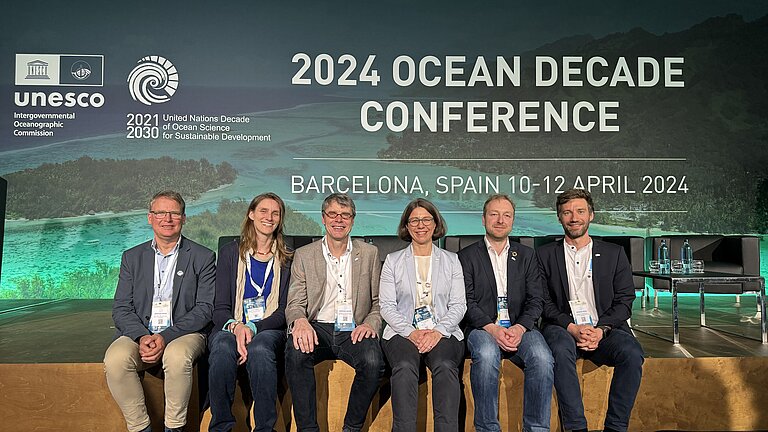
On site for GEOMAR (from left): Dr. Toste Tanhua, Sigrid Keiser, Professor Dr. Arne Körtzinger, Director Professor Dr. Katja Matthes, Dr. Björn Fiedler, Tobias Hahn. Not in the picture: Dr. David Keller, Dr. Ulrike Heine. Photo: Tobias Hahn, GEOMAR
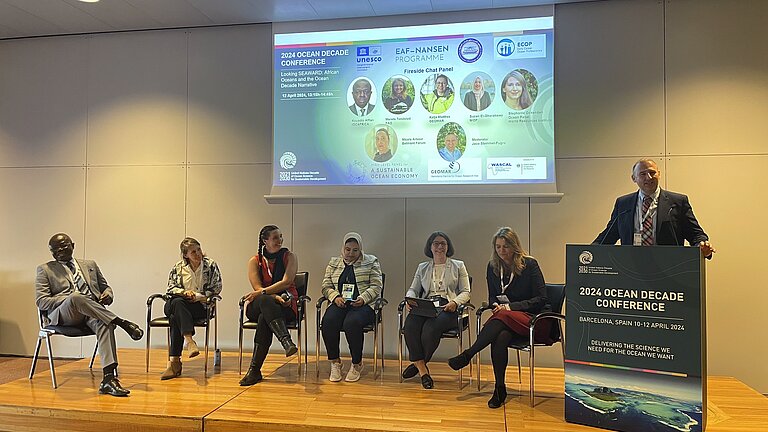
At the event "Looking Seaward: African Oceans and the Ocean Decade Narrrative" GEOMAR Director Professor Dr. Katja Matthes presented the FUTURO project. Photo: Tobias Hahn, GEOMAR
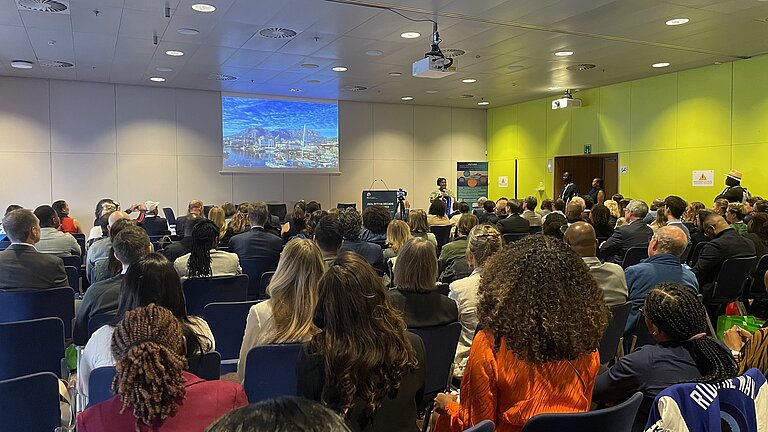
The joint event "Looking Seaward: African Oceans and the Ocean Decade Narrative" struck a chord at the conference. Photo: Tobias Hahn, GEOMAR
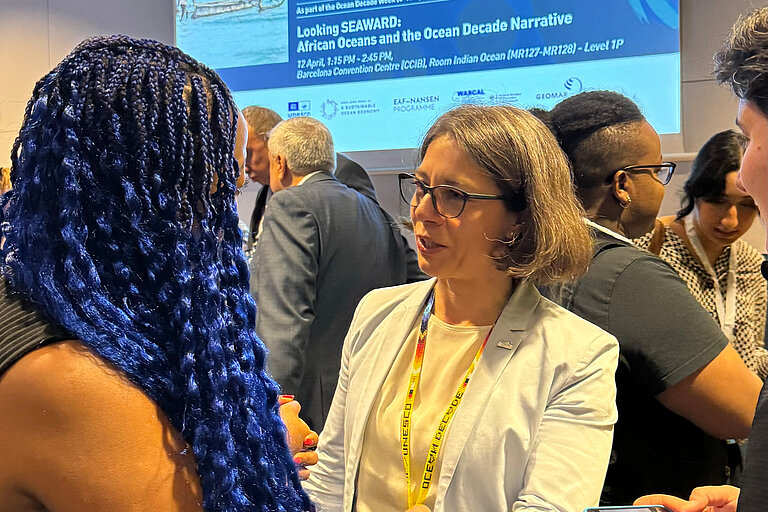
GEOMAR Director Professor Dr Katja Matthes (right) in conversation with Zandile Ndhlovu, moderator of the event "Looking Seaward: African Oceans and the Ocean Decade Narrative". Photo: Tobias Hahn, GEOMAR
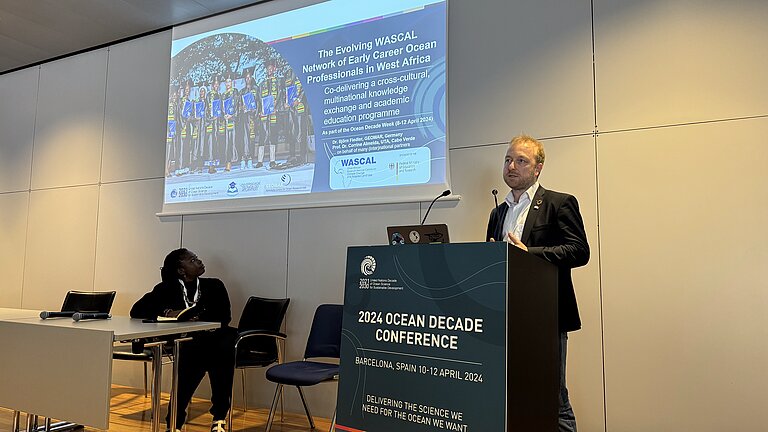
Dr. Björn Fiedler presented the International Master's Programme „Climate Change and Marine Sciences“ in Cabo Verde. Photo: Tobias Hahn, GEOMAR
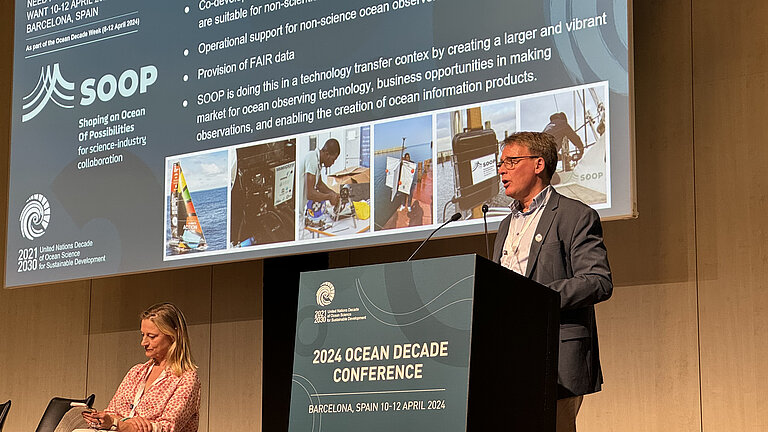
Dr. Toste Tanhua presented the innovation platform “Shaping an Ocean Of Possibilities” (SOOP). Photo: Tobias Hahn, GEOMAR
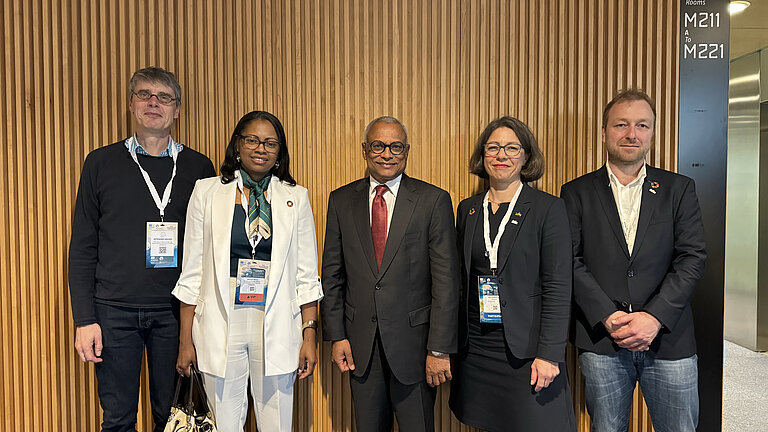
Meeting of the GEOMAR delegation with the President of Cabo Verde at the Ocean Decadal Conference 2024 in Barcelona. Photo: Tobias Hahn, GEOMAR
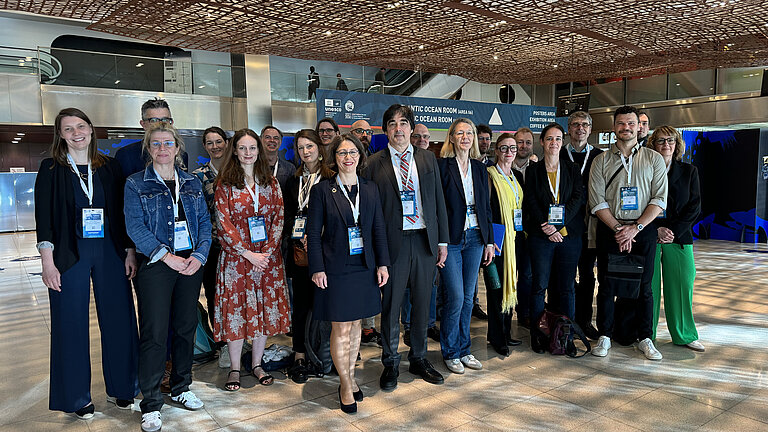
German participation at the 2024 Ocean Decade Conference in Barcelona. Photo: Tobias Hahn, GEOMAR


